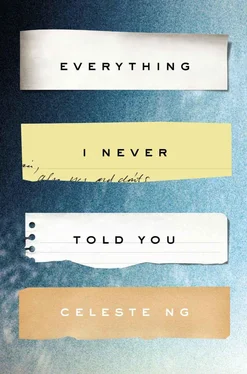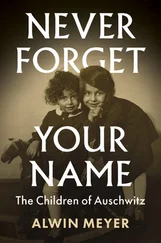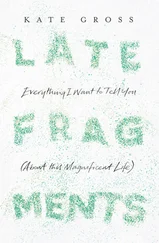From then on, she called every few days, when the yearning for home became too much. No matter what time it was, James picked up the phone, and she worried, imagining him sleeping at the kitchen table, or in his study beside the extension. Yet the one time she received no answer — James and the children, out of food, had been forced to the grocery store at last — she had panicked, imagining house fires or earthquakes or meteor strikes, and called again and again, every five minutes, then every two, until James’s voice had come across the line at last. Another time, when she called in the middle of the morning, James, exhausted, had fallen asleep at his desk, and Nath had picked up instead. “Lee residence,” he had answered dutifully, just as she’d trained him, and Marilyn wanted to say, Are you all right? Are you being good? but found her throat swollen shut with longing. Nath, to her surprise, didn’t hang up at the silence. He had knelt on the kitchen chair, which he’d climbed to reach the phone, listening. After a moment, Lydia had tiptoed in from the doorway and crouched beside him, the handset sandwiched between their ears, for two minutes, three minutes, four, as if they could hear everything their mother was feeling and wishing in the gentle hiss on the line. They had been the ones to hang up first, and after the click, Marilyn had cradled the phone for a long time, hands trembling.
Nath and Lydia never mentioned this to their father, and James never reported the calls to the police. He had already begun to suspect that they were not much interested in helping him, and deep inside, where his old fears lay coiled, he thought he understood their reasoning: it had only been a matter of time before a wife like Marilyn left a husband like him. Officer Fiske continued to be very kind, but James resented this even more; the politeness made it even harder to bear. For her part, Marilyn told herself each time she put down the receiver that it was the last time, that she would not call again, that this was proof her family was fine, that she had begun a new life. She told herself this so firmly that she believed it completely, until the next time she found herself dialing their number.
She told herself that everything was possible now, in this new life. She subsisted on cereal and sandwiches and spaghetti from the pizza joint down the street; she had not known it was possible to live without owning a single pot. Eight more credits, she calculated, and she would finish her degree. She tried to forget everything else. She rolled Nath’s marble between her fingers as she wrote away for medical school brochures. She snapped the clip of Lydia’s barrette — one-two, one-two — as she penned tiny notes in the margins of her textbook. She concentrated so hard that her head ached.
That third day of July, Marilyn flipped a page in her textbook and black cotton clouded her view. Her head went heavy as a melon, pulling her off balance, buckling her knees, dragging her toward the floor. In a moment, her vision cleared, then her mind. She discovered a spilled glass of water trickling off the tabletop, her notes scattered across the tiles, her blouse clammy and damp. Only when her own handwriting came back into focus did she stand again.
She had never fainted before, never even come close, even during the hottest days of summer. Now she was tired, almost too tired to stand up. Easing herself onto the sofa cushions, Marilyn thought, Maybe I’m sick, maybe I caught a bug from someone. Then another thought arrived and her whole body went cold. It was the third; she was sure of this; she had been counting down the days to this exam. That meant she was nearly — she counted on her fingers, alert now, as if she’d been doused with icy water — three weeks late. No. She thought back. Since before she left home almost nine weeks ago. She hadn’t realized it had been so long.
She wiped her hands on her jeans and tried to stay calm. After all, she had been late before. When she’d been stressed, or sick, as if her body hadn’t enough attention to keep everything running, as if something had to be put on hold. Working as hard as she was, perhaps her body could not keep up. You’re just hungry, Marilyn told herself. She hadn’t eaten all day and it was nearly two o’clock. There was nothing in the cupboard, but she would go to the store. She would get food and eat it and then she would feel much better. Then she would get back to studying.
In the end, Marilyn would never take that exam. At the store, she put cheese and bologna and mustard and soda into her cart. She lifted a loaf of bread from the shelf. It’s nothing, she told herself again. You’re fine. With the grocery sack under her arm and the six-pack of bottles in her hand, she headed to her car, and without warning the parking lot spiraled around her. Knees, then elbows, slammed into asphalt. The paper sack tumbled to the ground. Soda bottles shattered on the pavement, exploding in a spray of fizz and glass.
Marilyn sat up slowly. Her groceries lay scattered around her, the loaf of bread in a puddle, the jar of mustard slowly rolling away toward a green VW van. Cola dripped down her shins. She had cut herself on the glass: a deep gash right across the center of her palm, straight as a ruler’s edge. It did not hurt at all. She turned her hand from side to side, letting the light play on the layers of skin like sandstone strata: clearish pink, like watermelon, with flecks of snowy white. At the bottom, a river of rich red welled up.
She dug in her purse for a handkerchief and touched its corner to her palm and suddenly the cut was drained dry, the handkerchief blotched scarlet. The beauty of her hand amazed her: the pureness of the colors, the clarity of the white flecks and the thin lines on the muscle. She wanted to touch it, to lick it. To taste herself. Then the cut began to sting, and blood began to pool in her cupped palm, and she realized she would have to go to the hospital.
The emergency room was almost empty. The next day it would be full of Fourth of July accidents: food poisoning from bad egg salad, burned hands from grill fires, singed eyebrows from rogue fireworks. That afternoon, though, Marilyn walked up to the front desk and held out her hand, and in a few minutes she found herself on a cot, a petite young blonde in white taking her pulse and examining her palm. And when the young blonde said, “Let’s get you stitched up,” and took a bottle of anesthetic from a cupboard, Marilyn blurted out, “Shouldn’t the doctor do that?”
The blond woman laughed. “I’m Dr. Greene,” she said. Then, as Marilyn stared, she added, “Would you like to see my hospital badge?”
As the young woman closed the gash with neat black stitches, Marilyn’s hands began to ache. She clenched her teeth, but the ache spread into her wrists, up to her shoulders, down her spine. It wasn’t the surgery. It was disappointment: that like everyone else, she heard doctor and still thought — would forever think— man . The rims of her eyes started to burn, and when Dr. Greene tied off the last stitch and smiled and said, “How are you feeling?” Marilyn blurted out, “I think I’m pregnant,” and burst into tears.
After that everything happened very fast. There were tests to be run, vials of blood to be drawn. Marilyn didn’t remember exactly how it worked but knew it involved rabbits. “Oh, we don’t use rabbits anymore,” the pretty young doctor laughed, slipping the needle into the soft crook of Marilyn’s arm. “We use frogs now. Much faster and easier. Isn’t modern science wonderful?” Someone got Marilyn a cushioned chair and a blanket to drape over her shoulders; someone asked for her husband’s phone number, which Marilyn, in a daze, recited. Someone brought her a glass of water. The cut on her hand was closed and mute now, black sutures binding the raw flesh shut. Hours passed, but it seemed only a few minutes before James was there, radiant with amazement, holding her good hand while the young doctor said, “We’ll call you with the results on Tuesday, Mr. and Mrs. Lee, but it looks like you’ll be due in January.” Then, before Marilyn could speak, she stepped into the long white hallway and disappeared.
Читать дальше












